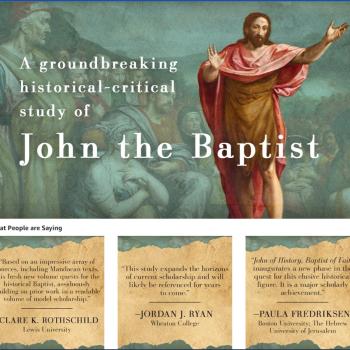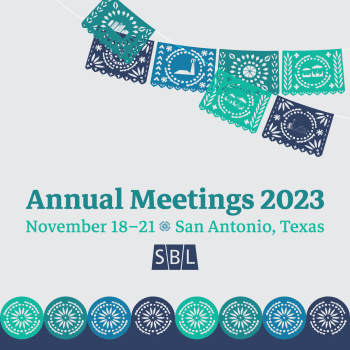The first session of AAR/SBL proper that I attended this year (after the pre-conference NetVUE workshop and Enoch Seminar symposium) was focused on the references to Nazarenes/Nazoreans in a variety of ancient sources. My own interest in this stems from the fact that Mandaean sources use the term nasurai as a way of referring to themselves. Yet they don’t esteem Jesus. How does one explain this? By the end of this session, I felt the problem even more acutely – but also began to see possible avenues that could perhaps lead towards a solution.
Jason BeDuhn took us into Manichaean sources. Given that we can see direct influence of Mandaeism on Manichaeism (most clearly in the Coptic Psalms of Thomas), the one explicit question attributed to a Nazorean might perhaps come from a Mandaean. BeDuhn’s paper focused on evidence that Mani was not as anti-Torah as some later Manichaeans were, suggesting that his ambivalent stance reflected his Elchasite upbringing which in turn stems from the Torah-apathetic phenomenon that has begun to be referred to as Enochic Judaism. Many Jewish Christians reflect this sort of viewpoint, affirming some parts of Torah but rejecting others, claiming for instance that animal sacrifice was never something God intended.
Michal Bar-Asher Siegal explored the Talmudic and other Rabbinic references to notsrim. Here too the possibility that Mandaeans are in view needs to be taken seriously. The term appears only in Babylonian Jewish sources, not Palestinian ones. Adam Becker presented on the Persian Martyr Acts, in which “Nazarene” is a term that authorities apply to Christians, but which the Christians themselves reject.
Finally, Charles Haberl (collaborator with me on the Mandaean Book of John project) presented what seems like a watertight case that the form Nazorean, far from being inexplicable as deriving from the place name Nazareth, is exactly what should be expected, linguistically speaking, in the case of a toponym derived from a verbal form, of which there are several in that part of Galilee.
This of course left me pondering the puzzle this creates as far as finding a historical explanation is concerned: why would Christians who like Jesus almost universally reject being called “Nazoreans/Nazarenes” and the Mandaeans who reject Jesus embrace the term as a self-identification?
Charles and I ended up talking about this for hours afterwards, and there are definitely some intriguing avenues that are worth exploring. One of those is the reason I included Enochic Judaism in the title of this post. There appears to be a scholarly consensus that 1 Enoch stems from Upper Galilee. Galilee being “Jewish” was a result of a Hasmonean effort to settle and control the region, which would otherwise more naturally align with Samaria and the northern tribes. Perhaps what we find in John the Baptist and Jesus reflects the combination of ideas from the far north that were less dominated by the imposition of Torah in the post-exilic period, and the Judaean perspectives brought to the region.
When we consider this in connection with the tradition that John and Jesus were related, perhaps we could view Nazareth as a hub for some of this creativity, with Christians subsequently seeking to dissociate Jesus from the reputation the place had from the perspective of Judaean forms of Judaism? Could the name variously rendered Gennasaret/Ginozar and so on have some connection, perhaps suggesting that “Nazarene” denotes not the inhabitant of a specific village, but a Galilean?
Enochic literature also came up in interesting ways in a session about esoteric movements in the 20th century. The rediscovery of the Mandaean Ginza through its translation into Latin and 1 Enoch through its translation into English in the 19th century contributed quite a bit to modern esotericism. 1 Enoch has continued to do so, and has had a broader influence, presumably because it was translated into English.
See also this post from the late Larry Hurtado:
1 Enoch: An Update on Manuscripts and Cautionary Notes on Usage
And on the Samaritans, who also need to fit into the picture, see the AJR article about Samaritans and their representation in ancient sources.













